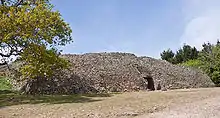cairn
English

The Cairn of Gavrinis, Brittany
Etymology
From Scots cairn, from Scottish Gaelic carn (“heap of stones”), from Proto-Celtic *karnos, from Proto-Indo-European *ḱerh₂- (“horn”).
Pronunciation
- (Received Pronunciation) IPA(key): /kɛən/
- (General American) IPA(key): /kɛəɹn/
Noun
cairn (plural cairns)
- A rounded or conical heap of stones erected by early inhabitants of the British Isles, apparently as a sepulchral monument.
- 1826, Thomas Campbell, Glenara, in The Poetical Works of Thomas Campbell, page 105:
- "Now here let us place the gray stone of her cairn: / Why speak ye no word!"—said Glenara the stern.
- 1826, Thomas Campbell, Glenara, in The Poetical Works of Thomas Campbell, page 105:
- A pile of stones heaped up as a landmark, to guide travelers on land or at sea, or to arrest attention, as in surveying, or in leaving traces of an exploring party, etc.
- A cairn terrier.
Synonyms
Derived terms
- cairned (adjective)
- cairn terrier
Translations
monument
|
landmark
terrier — see cairn terrier
- The translations below need to be checked and inserted above into the appropriate translation tables, removing any numbers. Numbers do not necessarily match those in definitions. See instructions at Wiktionary:Entry layout#Translations.
References
- cairn in Webster’s Revised Unabridged Dictionary, G. & C. Merriam, 1913.
- “cairn” in The American Heritage Dictionary of the English Language, 5th edition, Boston, Mass.: Houghton Mifflin Harcourt, 2016, →ISBN.
This article is issued from Wiktionary. The text is licensed under Creative Commons - Attribution - Sharealike. Additional terms may apply for the media files.